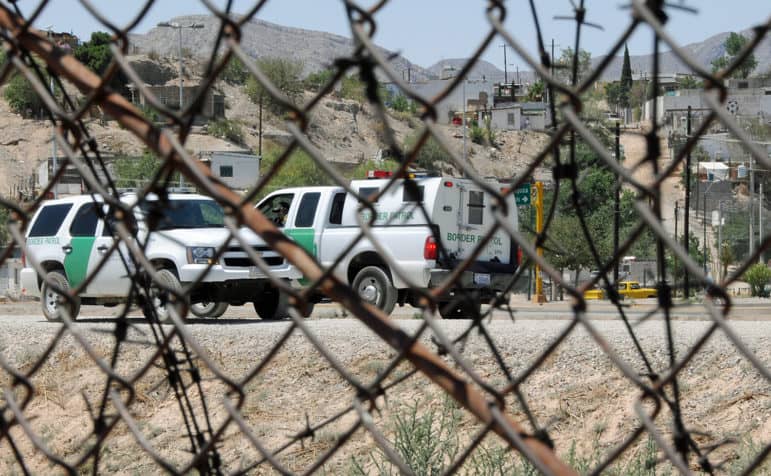
Heath Haussamen / NMPolitics.net
A scene from the U.S./Mexico border. In the foreground, behind a barbed-wire fence, U.S. Border Patrol agents speak with each other in El Paso, Texas. Across the Rio Grande, in the background, is Cuidad Juárez, Mexico.
New Mexico Gov. Michelle Lujan Grisham ordered the withdrawal Tuesday of most National Guard troops who have been deployed to the U.S.-Mexico border, reversing a decision by her Republican predecessor.
The Democratic governor, who directed other states to pull their Guard troops out, too, announced her decision just before Republican President Donald Trump delivered a State of the Union address in which he continued to push for the construction of a wall along the border — one of his signature campaign promises.
A spokeswoman for the governor said 118 Guard troops are currently deployed to the border, including 25 from out of state.
“I reject the federal contention that there exists an overwhelming national security crisis at the southern border, along which are some of the safest communities in the country,” Lujan Grisham said in a statement issued Tuesday evening.
“However,” she said, “I recognize and appreciate the legitimate concerns of residents and officials in southwestern New Mexico, particularly Hidalgo County, who have asked for our assistance, as migrants and asylum-seekers continue to appear at their doorstep.”
As part of her order, Lujan Grisham directed between 11 and 15 Guard troops who have been stationed in Hidalgo and surrounding counties to remain in place “to assist with the ongoing humanitarian needs of communities there.”
She also directed the New Mexico National Guard to “immediately assess whether an augmented presence in the southwestern part of the state is needed.”
Nora Meyers Sackett, a spokeswoman for the governor, said Lujan Grisham has been considering whether to cancel the deployment of National Guard troops at the border for some time.
“It wasn’t a political decision made in terms of the timing of the State of the Union,” she said.
“Obviously, the subject matter is related,” Meyers Sackett added, “but this is a decision made on security, on the humanitarian need of the folks coming over the border who are overwhelmingly women and children looking for a better life, and ensuring those folks in Hidalgo and Luna [counties] that we address their concerns as well. But it’s not a political decision based on timing.”
In addition to keeping about a dozen Guard troops on the border, the governor also directed the state Department of Public Safety to temporarily deploy “an initial group” of six New Mexico State Police officers to assist the day-to-day operations of local law enforcement in Hidalgo County, which the county manager had requested.
“Leadership at the Department of Public Safety will assess whether further supplemental assistance is needed,” the Governor’s Office said.
Hidalgo County Commission Chairman Anthony Mora said the governor made the right decision to keep some Guard troops in Hidalgo and surrounding counties, where he said they’re most needed.
“We have a very unique situation in Hildalgo County,” he said. “The way the immigration is funneled, it pretty much sends everybody our way. … We have an environment where we’re having an influx of immigrants coming in, so that’s changed everything. But we have a strategy where we’re working on some really tangible things that can help us.”
Mora declined to disclose specifics, saying they are still in the planning stages and that the governor herself might want to announce the strategies. But he said they involve technology, communications and law enforcement.
“I’ve been working closely with the Cabinet secretary with the homeland security for New Mexico,” he said. “We’ve been strategizing. She’s going to come down to the border tomorrow, and we’re going to go take a tour. This is just the beginning.”
Mora said county commissioners approved the hiring of two additional deputies last week, which he called “a big financial burden on our county.”
“But we know we have to do something,” he said.
Meyers Sackett said the 25 out-of-state Guard troops at the border are from Arkansas, Kansas, Kentucky, New Hampshire, South Carolina and Wisconsin.
The governor “is within her powers to direct the National Guard troops who were deployed here from other states to withdraw from their deployment,” Meyers Sackett said, adding that it will take between 45 and 60 days for the troops to pull out.
“It takes a bit to get folks moving home,” she said. “But it’s a process that will begin immediately.”
